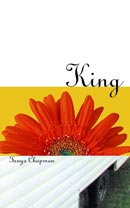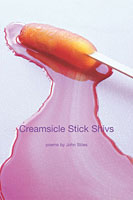DominionSections
Browse Articles
- IndependentMedia.ca
- MostlyWater.org
- Seven Oaks
- BASICS Newsletter
- Siafu
- Briarpatch Magazine
- The Leveller
- Groundwire
- Redwire Magazine
- Canadian Dimension
- CKDU News Collective
- Common Ground
- Shunpiking Magazine
- The Real News
- Our Times
- À babord !
- Blackfly Magazine
- Guerilla News Network
- The Other Side
- The Sunday Independent
- Vive le Canada
- Elements
- ACTivist Magazine
- The Tyee
- TML Daily
- New Socialist
- Relay (Socialist Project)
- Socialist Worker
- Socialist Action
- Rabble.ca
- Straight Goods
- Alternatives Journal
- This Magazine
- Dialogue Magazine
- Orato
- Rebel Youth
- NB Media Co-op
Radio
May Books
May 7, 2007
May Books
Plays by Amiel Gladstone, poems by Susan Elmslie, Tanya Chapman's King, and Creamsicle Stick Shivs by John Stiles
 Hippies and Bolsheviks (and other plays)
Hippies and Bolsheviks (and other plays)
Amiel Gladstone
Coach House Books: Toronto, 2007
It’s refreshing to read drama with a minimalist aesthetic in this era of over-used pyrotechnics and arty projections. A pity, then, that the minimalism here extends to plot and character development. What is interesting and successful about these plays, however, is Gladstone's play with time: each play is like a closed tank in which the events of the characters’ lives slosh back and forth between the present and the past, resulting in something rhythmical and cyclic. Lena’s Car, a short one-woman show, takes place solely in the front seat of a car, but moves from a crumbling marriage in the present to a past crisis of innocence lost. The Wedding Pool, by far the most ambitious, speculates on what might happen when three unhappily single friends decide to contribute $50 per month to a pool, to be collected by the first one to get married. The title play, Hippies and Bolsheviks, examines the consequences of free love through an unlikely love triangle in 1960’s Vancouver. Together, these three plays make a lively and entertaining read.
--Matthew J. Trafford
 I, Nadja, and Other Poems
I, Nadja, and Other Poems
Susan Elmslie
Brick Books: Toronto, 2006
One of the first things to notice about this collection is how sensitively juxtaposed the poems are. The first poem, “Pomegranate,” though unrelated to “Felicity,” the second, sets up the tone so well that when we reach the phrase, “peerless alexandrine,” it sounds like an unfamiliar tropical fruit. Elmslie moves back and forth here between the sensuous and the hilarious, from “collarbones, knobs of the locked armoire of his heart,” to “rapping out blurbs a la Don Pardo/ for unlikely TV pilots:/ She's a hard-nosed Wall Street lawyer;/ He's a displaced Eskimo woman. Together/ they're Fishing for Clues.” The book's five sections focus around a few specific areas of concern: “femininity,” violence against women, physical objects, and illness all pique Elmslie's poetic interest. Although the “Nadja” poems—a suite of poems exploring the real character of the Nadja on whom Andre Breton's novel is based— are meant as the book's centrepiece, and while they bring the historical context of Elmslie's thinking more sharply into focus, I actually preferred the sections in which Elmslie speaks in her own voice. It's an intelligent and original one.
--Linda Besner
 King
King
Tanya Chapman
Coach House: Toronto, 2006
This is a strange and endearing book. The protagonist, who calls herself Hazel, is a girl from an upper- middle class family who has moved to a trailer park and shacked up with King, the eponymous mixed-up rock-star-cum-layabout she's fallen in love with. It both is and isn't the usual story of a woman living in a trailer park and being abused by her beer-swilling partner; although a beer bottle does at one point bounce off Hazel's head, King has none of the melodrama you might expect. Hazel, who narrates, does so with an amiable fuzziness that makes her sound always slightly buzzed . She tells us about the flower seeds she's scattered over the grass around her trailer—“You have to walk right through the flowers to get to the door—I never thought of a path”—and the fearlessness that makes King so special—“King's very existence would terrify my dad and my dad's dad and a hundred dads before them.” The split, when it comes, is remarkably understated and spoils none of the sweetness of the book's first half. Though the story is simple and somewhat repetitively structured, Hazel is worth getting to know.
--Linda Besner
 Creamsicle Stick Shivs
Creamsicle Stick Shivs
John Stiles
Insomniac Press
2006
Stiles' second poetry collection travels from Nova Scotia to England by way of Toronto, and its three sections reflect these phases. Stiles delights in dialect, humour, and narrative and uses colloquialisms to put poetry in the mouths of those who wouldn't call it such, like the rogue romantic begging: “But Jesus girl, wouldja take off / yer goddamned top en let that stunning church of a tit / fall out yer blouse, so we can turn our heads en waltz / like two goddamned lovestruck swans cross the rooftop / in this glorious Halifax snowstorm?” Constantly self-satirizing, Stiles is cheeky, neurotic and occasionally poignant as in “Felt Like Cryin,” or “Oh, About the Money.” His narrators make characters and caricatures of those around them, be they strangers, coworkers, church fellows, or devoted life partners, and the satiric humour is well supported by soundplay. The richest stories and language play are in the first section, Halifax Snowstorm, and for this alone the collection deserves attention. Frequent shifts of person, usually from first to second, mostly work well to involve the reader and multiply perspectives, but can occasionally blur the story to confusion.
-- Jane Henderson
Related articles:
By the same author:
Comments
Archived Site
The Dominion is a monthly paper published by an incipient network of independent journalists in Canada. It aims to provide accurate, critical coverage that is accountable to its readers and the subjects it tackles. Taking its name from Canada's official status as both a colony and a colonial force, the Dominion examines politics, culture and daily life with a view to understanding the exercise of power.